The theological library of the future
Free, digital, and global
By Thomas E. Phillips
Let’s begin with the obvious: Libraries are essential for quality education. And libraries are very expensive to operate. Those are long-standing realities. But right now theological libraries are facing another, and perhaps an even bigger, challenge. With the exponential growth of online and nonresidential programs, librarians must now deliver content to students who are scattered across the globe — and do so without compromising the quality of the research or committing intellectual property theft by distributing content without proper licensing.
To address this challenge, a coalition of 18 seminaries from around the globe — members of the Digital Theological Library (DTL), a non-profit library initiated by the Claremont School of Theology — have created a free, online, professionally curated collection of globally accessible digital content in religious studies. The Open Access Digital Theological Library (OADTL), owned and maintained by the staff of the DTL, it is a shining example the completely free, globally accessible library of the future.
What is open access and why is it needed?
Open access is the term used to describe published research content that is distributed online and free of cost. The reason behind the publication of open access content is to return scholarly publishing to its original purpose — spreading knowledge.
Because it is expensive to license digital content, many research libraries encourage publishers to make scholarly publications available online, for free, and to do so when they are published, not years later. (Sometimes, libraries, authors, or their sponsoring institutions pay publishers an “author processing fee” to make sure publishers make content open access.)
Some publishers, authors, scholarly societies, museums, universities, and archives have created free and legal access to tens of thousands of books and journals. In North America, nearly all academic presses have made at least some of their titles open access, and in Europe, about 20 percent of the academic books published are now available in open access format from the first day of publication. (Unfortunately, the quantity and quality of fully open access e-journals still lags behind the quantity and quality of open access e-books.)
Publishers seldom promote the free versions if there are paid versions for sale as well. So most people, including many librarians, do not even know that free, legal content is available.
History of the Open Access Digital Theological Library
The mission of the OADTL, which is staffed by professional librarians, is to curate high-quality content in religious studies and related disciplines from publisher websites, institutional repositories, scholarly societies, archives, and stable public domain collections.
Here’s the background: The librarians at the DTL were collaborating to create a digital library in religious studies for their participating seminaries, but, even with so many seminaries working together, budgets were limited. So when a DTL member needed a digital book, the DTL librarians would scour often-obscure repositories to find free, legal access to that content before they purchased access from a commercial vendor.
By the time the we had located and cataloged close to 100,000 e-books, we set up a free website and began sharing this content with the world — without charge. That was in July 2018.
The OADTL today
As of September 2019, the OADTL has curated nearly 250,000 e-books, more than 50,000 dissertations and nearly 7 million scholarly articles. These figures include tens of thousands of e-books that are sold by various commercial enterprises. The OADTL curates free, legal access to contemporary e-books from publishers like Brill, Cambridge, Oxford, University of Chicago, Gorgias, and the Society of Biblical Literature.
Seminary sells 148-year-old campus
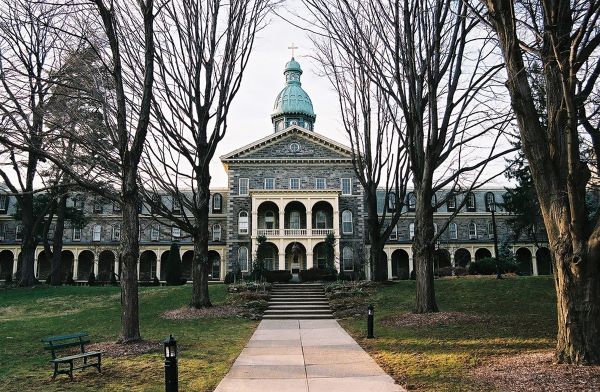
Saint Charles Borromeo Seminary has been the seminary of the Archdiocese of Philadelphia since 1832. (Credit: Jay Blossom)
Saint Charles Borromeo Seminary, the seminary of the Catholic Archdiocese of Philadelphia, has sold its Wynnewood, Pennsylvania, campus to Main Line Health, the parent company of Lankenau Medical Center, which is directly across the street from the seminary. The sale was finalized in May 2019. The seminary will continue operations on the Wynnewood campus for up to five years.
The Main Line Times, a local newspaper, reported that the property sold for $43.5 million. The newspaper also reported that in 2018, before the sale was finalized, the 75-acre campus was declared a Class 1 historic resource, a designation that gives township commissioners the authority to reject any possible plans to demolish seminary buildings.
Concurrently, officials at Saint Charles and Neumann University in Aston, Pennsylvania, are discussing the possibility of forming a partnership. Also, according to seminary rector, Bishop Timothy Senior, Saint Charles officials have been discussing the purchase of property adjacent to the Neumann University campus which is owned by the Sisters of Saint Francis of Philadelphia, the religious order that sponsors the university.
New leadership for teaching center
Dr. Nancy Lynne Westfield has been appointed director of the Wabash Center for Teaching and Learning in Theology and Religion at Wabash College in Crawfordsville, Indiana. In January 2020 she will succeed Dr. Nadine S. Pence, director since 2007, who is retiring at the end of 2019.
Westfield is currently professor of religious education at Drew Theological School in New Jersey, where she has been teaching since 1999. She is the author or coauthor of several books, including Being Black, Teaching Black: Politics and Pedagogy in Religious Studies; Black Church Studies: An Introduction; and Dear Sisters: A Womanist Practice of Hospitality. For the past 16 years, Westfield has led programs at the Wabash Center and is a frequent contributor to its blog.
An ordained deacon in the United Methodist Church, Westfield is a graduate of Murray State University, Scarritt Graduate School, Drew Theological School, and Union Institute in Cincinnati.
Chicago seminary forms partnership with Islamic graduate school
Chicago Theological Seminary (CTS) and Bayan Claremont, an Islamic graduate school that is part of Claremont School of Theology in Claremont, California, have entered into an academic partnership. Effective July 2019, the schools will be offering an M.Div. and a graduate certificate program with a concentration in Islamic chaplaincy.
CTS president, Stephen G. Ray Jr., says the partnership will allow CTS to expand its mission of “delivering theological education that is relevant and transformative to the religiously plural society, which is the reality of the United States.” And Jihad Turk, president of Bayan, says the partnership “provides the opportunity for the training and credentialing of the next generation of Muslim-American leaders and scholars, both women and men…and affirms Bayan’s commitment to interfaith collaboration in addressing the pressing challenges of today.”
CTS will provide Bayan with classroom space and shared services on the Chicago campus. Additionally, the presidents of the two schools will sit on the other’s board as nonvoting members.
Bayan will continue its usual operations on the Claremont campus for the 2019–20 year, and Bayan staff will be remotely overseeing operations of the new programs in Chicago.
This partnership coincides with Claremont’s planned affiliation with Willamette University in Salem, Oregon. Claremont plans to relocate incrementally, first moving several faculty and staff members to Oregon to oversee hybrid and residential master’s programs during the 2019–20 academic year.
Claremont and Willamette will continue as separate institutions throughout this current academic year. The full affiliation and relocation are planned for the 2020–21 year, when it is expected that Claremont will become a graduate school within Willamette University.
Changes at the top
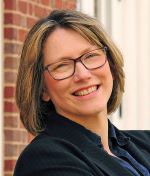
■ The board of trustees of Acadia Divinity College in Wolfville, Nova Scotia, has named the Rev. Dr. Anna M. Robbins to a six-year term as president and dean of theology of Acadia University. She succeeds the Rev. Dr. Harry G. Gardner, president since 2008, who retired in June of this year.
Robbins has been at Acadia Divinity College since 2012 as academic dean, director of doctoral studies, and associate professor of theology, culture, and ethics. Later, she became the inaugural director of the Andrew D. MacRae Centre for Christian Faith and Culture and was appointed to a chair in theology, ethics, and culture. Before 2012 Robbins was senior lecturer in theology and contemporary culture at the London School of Theology in the United Kingdom.
She is a graduate of Carleton University, Acadia University, and the University of Wales. Robbins and her husband, Peter, have one son.
■The board of trustees of the Interdenominational Theological Center in Atlanta has named Dr. Matthew Wesley Williams as interim president. He succeeds Dr. Edward L. Wheeler, who retired in July after serving as president since 2015.
Since 2014 Williams has been vice president of strategic initiatives at the Forum for Theological Exploration (FTE) in Atlanta. Previously he was FTE’s director of strategic partnerships and director of doctoral fellowships.
An ordained elder in the Presbyterian Church (USA), Williams is a graduate of Florida A&M University and the Interdenominational Theological Center.
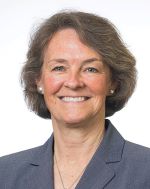
■ Dr. Alison Benders has been named interim dean of the Jesuit School of Theology of Santa Clara University in Berkeley, California. She succeeds Father Kevin O’Brien, dean since 2016, who has now been appointed president of Santa Clara University.
Benders joined the Jesuit School of Theology in 2014 as an associate dean and a senior lecturer in systematic theology. Prior to that, she served in senior level administration at several Catholic institutions in Ohio and, before that, was an antitrust litigator in Philadelphia.
Benders is a graduate of Yale University, the University of Virginia School of Law, and Boston College.
■ Dr. Elias Ortega-Aponte has been named president of Meadville Lombard Theological School in Chicago. He succeeds Dr. Lee Barker, who retired after leading the school since 2003.
At the time of his appointment, Ortega-Aponte had been on the faculty of Drew University Theological School since 2011 as associate professor of social theory and religious ethics. He also serves the Unitarian Universalist denomination as a member of both the commission on institutional change and the religious education credentialing committee.
Ortega-Aponte is a graduate of Calvin College and Princeton Theological Seminary.
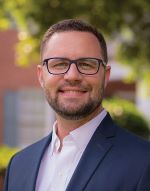
■ The board of trustees of New Orleans Baptist Theological Seminary has elected Dr. James K. Dew Jr. as its next president. Dew succeeds Dr. Charles S. Kelley Jr., who retired in July of this year after heading the seminary since 1996.
Prior to his appointment, Dew was vice president for undergraduate studies and distance learning at Southeastern Baptist Theological Seminary. He has also served in a number of church ministries, including eight years as senior pastor of Stony Hill Baptist Church in Wake Forest, North Carolina.
Dew is a graduate of Toccoa Falls College, Southeastern Baptist Theological Seminary, and the University of Birmingham in the United Kingdom. He and his wife, Tara, have four children.
■ The board of trustees of Phoenix Seminary in Arizona has named Dr. Brian Arnold president of the seminary. He succeeds the founding president, Dr. Darryl DelHousaye, who has been named chancellor after leading the seminary for 30 years.
Arnold has been on the faculty of Phoenix Seminary since 2015, first as assistant professor of theology and most recently as academic dean. He was previously pastor of the First Baptist Church in Smithland, Kentucky. Prior to being called to ministry, Arnold was an emergency medical services technician.
Arnold is a graduate of Eastern Kentucky University and the Southern Baptist Theological Seminary. He and his wife, Lauren, have two children.
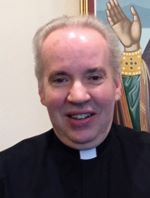
■ The Most Rev. Salvatore J. Cordileone, the Catholic archbishop of San Francisco, has named Father Daniel B. Donohoo to a five-year term as president-rector of St. Patrick’s Seminary and University in Menlo Park, California. Father Donohoo succeeds Bishop Robert Christian, the rector since January 2019, who died unexpectedly in his sleep in the seminary residence on July 11, 2019. A member of the Dominicans, Christian was ordained as a priest in 1976 and as a bishop in 2018. He was 70 at the time of his death.
At the time of his appointment as St. Patrick’s new rector, Father Donohoo was the seminary’s vice rector and dean of men, and he previously held positions as dean of students and vice president of administration. Before joining the seminary staff six years ago, he was a priest in the Archdiocese of Indianapolis, where he was pastor of several parishes including the Cathedral of Saints Peter and Paul.
Donohoo is a graduate of the University of San Diego, the Catholic University of Leuven, and Saint Patrick’s Seminary. He was ordained to the priesthood in the Archdiocese of Indianapolis in 1986.
■ The board of regents of Trinity International University in Deerfield, Illinois, has elected Dr. Nicholas Perrin as president. He succeeds Dr. David S. Dockery, president for five years, who was named university chancellor.
Prior to his appointment, Perrin was the Franklin S. Dyrness Professor of Biblical Studies at Wheaton College. He joined the faculty at Wheaton in 2005 and was dean of the Wheaton Graduate School from 2012 to 2016. Prior to joining the faculty of Wheaton, Perrin was a research assistant for Bishop N. T. Wright, the British biblical scholar. He was also transitional pastor of Faith Community Church in West Chicago, a position from which he resigned at the time of his appointment as president of Trinity International.
Perrin is an ordained minister in the Presbyterian Church of America but has been approved for a transfer of ordination to the Evangelical Free Church of America (EFCA), the denomination with which Trinity is affiliated. He and his wife, Camie, have two grown sons.
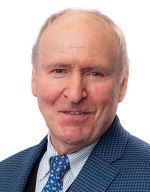
■ The board of trustees of Unification Theological Seminary in Barrytown, New York, has appointed Dr. Thomas Ward as president. He succeeds Dr. Hugh D. Spurgin, who retired after serving as president since 2015.
Prior to his appointment as president, Ward had been a member of the Unification board since 2015. He served from 2000 to 2018 as dean of the College of Public and International Affairs at the University of Bridgeport. He is the recipient of a Fulbright scholarship in France and was a visiting scholar in China and Taiwan.
Ward is a graduate of the University of Notre Dame, the University of Paris-Sorbonne, California State University, the Catholic Institute of Paris, De Salle University in the Philippines, and Unification Theological Seminary.
Unification Theological Seminary was founded in 1975 by the Rev. Sun Myung Moon. From its founding until 2015, the seminary held most of its classes on a bucolic 260-acre campus in Barrytown, New York, which is currently on the market for $15.5 million. For the last several years, the seminary has held its classes in a church-owned building in Midtown Manhattan.
■ The Rev. Dr. Jonathan L. Walton has been named dean of Wake Forest University School of Divinity in Winston-Salem, North Carolina. He succeeds the Rev. Dr. Jill Crainshaw, interim dean since 2018, who has been named vice dean for faculty development and academic initiatives at the School of Divinity.
Most recently, Walton served at the Memorial Church of Harvard University as Pusey Minister and the Plummer Professor of Christian Morals. He has been on the faculty of Harvard Divinity School since 2010, first as assistant professor of African American religions and then as professor of religion and society. Before joining the faculty at Harvard, Walton was a member of the faculty of the University of California, Riverside, for four years.
An ordained Baptist minister, Walton is a graduate of Morehouse College and Princeton Theological Seminary. He and his wife, Cecily Cline Walton, have three children.
News summaries by Shannon Beaudry.